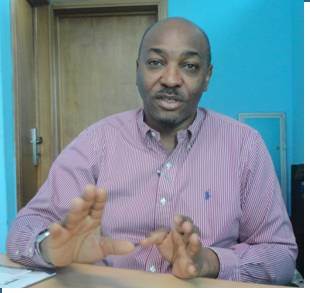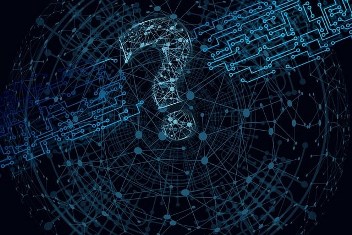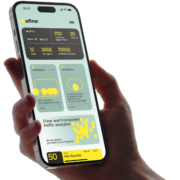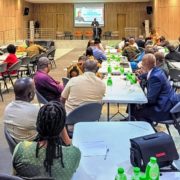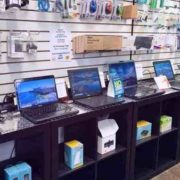Chinenye Mba-Uzoukwu is CEO at Infographic, an indigenous ICT firm. He is at once worried and at once optimistic. He is worried about inadequate government support for ICT firms even as the naira plummets with increasing need to go local even in ICT. He is worried about the proliferation of biometricsexercises and he is worried about the country’s lack of preparedness to beef up its education sector using technology tools. But he is optimistic about the capacity of Nigeria’s ICT sector to rebound and become much impactful on the economy. But if ICT must grow, government must make commitments so too are private and public sector stakeholders. Mba-Uzoukwu was the interview-guest of Anthony Nwosu, IT EDGE NEWS.
How can government deploy IT solutions for effective service delivery?
InfoGraphics is at the helm of this revolution with a rich and varied suite of IT products and services that help businesses and organisations make technology work harder for them. I think with technology we can sort a lot of things in government. If we look at ICT and its applications there shouldn’t be an issue of ghost workers. The main thing is that we should deploy ICT process in public sector. With biometrics we can sort out a lot of things from payroll management to other forms of needs within government. This can create transparency but we need to re orient our value systems. If we can get things sorted out we shouldn’t be in this mess. With ICT and cloud computing, the issue of ghost worker is gone. To me, what is undermining these payroll are human beings and there should be a continuous process of cleansing, we will not get this right the first day but with time we can sort it out. Look at how IT was used in the last elections. ICT can create controls and ensure some level of accountability but there should be continuous process of cleansing just as we are trying to do biometrics in the banking and elections.
Nairais losing value with the oil crash. Can we look inward to develop local ICT solutions for local challenges?
We shouldhavebeen using local solutions but know that we are not mandated yet, there is a pressure group that we formed through NCS (Nigeria Computer Society). Ministries and government agencies were mandated to use local ICT solutions this was during Obasanjo’s government. Let us say you put out a tender for a government contract and those computers must have operating system but there should be a degree of local content.We made sure that the policy was specific on what that is needed locally. We created process whereby all providers of indigenous content in technology must be in a local base and these content providers must have a certain level of certification so that we don’t have chaos in the system. This is to protect government from buying unnecessary technology contents. This kind of policy brought about organizations like Galaxy Backbone. We must buy locally produced hardware and software but the standards must be defined. Example is just like Windows which requires Windows hardware specification by Microsoft – this is what we tried to replicate in government. We are still on it and I believe that the Bureau for Public Procurement should have standardized the local procurement of technology bygovernment. This will be quantified, categorized and certified and given preferential access to government contracts. We should have a national standard in technology.
Different biometric exercises are being done by many organizations such as NIMC, INEC etc. Is this not chaotic?
There is a proliferation of biometric exercises in Nigeria. There should be a national standard for biometrics that will specify the agency that is in charge of biometrics in Nigeria. We should have started by standardization of biometrics in Nigeria, but what you get today is everybody doing biometrics. NIMC as far I know is not the agency that is in charge of standardization of biometrics in Nigeria. NIMC cannot tell, for instance, University of Lagos what to do in the area of biometrics and this is what I meant by standardization. We should as a country start by putting enabling laws that will control the biometrics instead of this proliferation in Nigeria. Just look today: the MTN, Globacom, Airtel, banks, INEC, etc. In USA, we have what is called the FBI standards. Some of these biometrics you have in Nigeria are just pictures and fingerprints and these pictures are poorly captured which might make some software not to read it. What law protects these databases that were captured by these various organisations? As a private citizens what protects your data in all these places. We should know that proliferation of these biometrics isn’t right. The responsibility of the government is to set up standards be it ISO or FBI standard and put enabling laws to protect those standards and citizens. We can’t have FRSC, INEC, CBN, MTN, and NIMC and others doing biometric. The last Bank Verification Numbers (BVN) exercise by banks, were they NIMC compliant? These are the things we should look at before we jump into technology. There must be relevant legislation that wraps around this biometrics.
Is government doing enough to support the Nigerian ICT firms?
As a software development company what we do basically is more of research and development and there are things that the government should understand in terms of support to local ICT firms. Everywhere in the world R & D is supported by government. I have run this organization for 20 years and I am yet to see any. Why I am saying this, we are meant to have a level of protection from the government such as tax holidays or exempt to a certain degree. I am saying that there is policy but this policy isn’t brought to life. If you look at the laws existing in all parts of the world, you will understand that you are not even allowed or guaranteed to be successful in the R & D process. This is because knowledge is gotten most time from failures. Most scientific breakthroughs come from failures or mistakes. Most of the interventions we had scientifically came from accidental processes. The Nigerian government must encourage R& D environment. This will make us compete globally. The Nigerian ICT firms should be given preferential treatment in government bidding not taxing them to death. Why shut down a business to pay taxes. We have these in national IT policy document; it has been there and yet to be worked on. Let us take the federal Inland Revenue services, what is their policy towards R& D. We should look at where we have competitive advantage and invest in it. There must be an enabling environment in research and development. There is a guy that graduated from the University of Ilorin that developed a miniature drug delivery system that delivers drugs in body but the government didn’t support him today he is in Canada running his company with his wife. One of the top doctors in a cancer research institute in United States is a Nigerian lady.These are the few examples of how the government is overlooking the R&D. We should invest in the things of the mind; we cannot for instance develop a better tyre than Dunlop or Michelin because they already have a competitive advantage. We should look at the things of the mind. We have intelligent people but it seems that the government isn’t focused on R&D in Nigeria. Why is it that our people excel in the brainy things overseas than when they are in Nigeria.
New World of Work is a new concept, but corporate Nigerian isn’t keying into this concept. Why?
This is a lifestyle question. Today, we use smart phones and our lifestyle is a digital lifestyle. Today people don’t carry pens and diaries around we have moved into a digital lifestyle without even knowing it. What we are talking about is that this digital lifestyle that you are comfortable with should be carried to the office. That is basically what the New World of Work concept is. Today you don’t go to phone booth to make call and look for dial tone, what you basically do ispicking your cell phone and making a call. This is part of the New World of Work. This is what we mean and we expect that the digital lifestyle that you are used to at home is carried to the office.
What can be done to make CorporateNigerian enthusiastic to this concept?
We don’t really believe in it but the fact is that the New World of Work is here. We have to know that we are changing and we have to move this expectation to the working environment. Take for instance about some decades ago we used to have tally number in banks where you spend the whole day trying to make some basic transactions in the bank but today you do not expect the bank to close. The digital lifestyle has made us to be able to go to bank by 12.00 am and make cash withdrawals and deposits using ATM. This is a form of New World of Work. The New World of Workis all about moving this expectation to the workplace. We shouldn’t see that as a constraint, the expectation should be digital in the New World of Work. We have to start seeing the office as the same with our lives. The key to unlocking the New World of Workis for the owners or the executive of businesses is to adopt this concept and cascade it. This is the only acceptable way. Most companies like Accenture are seeing this concept. Accenture has standardized this concept and made all the Accenture office globally to look exactly the same. This New World of Work is an environment where the IT fades into the background and it powers everything in the work environment but the ICT won’t stare at the worker. This IT is not staring at you but powers everything.
How has Infographic keyed into this concept of New World of Work?
A lot of the stuffs we do are in our heads and most things we do can be done from anywhere. We have a very flexible policy where people can even work from home to virtual office. Our workplace is so flexible that we have meetings in cloud and in our office today you don’t see cables around but most of everything we have is in the cloud. Workflows can be initiated from anywhere you are; we ensure that our staff members have access to internet everyday be it at home or office. Our staff can work from any part of the country and we have technology system that allows this concept to work seamlessly in our office. We in the InfoGraphics have come to understand this concept of New World of Work and have applied it in the way we work. Instead of staying in three hours in the traffic coming to work, you can plug into the company information system and work from anywhere. This has reduced redundancy. There are no physical barriers in office, we have so leveraged on technology that we can scan a document from here to Abuja. You don’t have to get out printing things because printers are networked to the cloud. We have optimized our own valuable assets and optimized them, what we have is a much more relaxed, efficient and auditable environment.
Won’t working from home expose organizations’ information to unauthorized people?
I think that these are fears that we have to confront and overcome but they are foolish fears. We have to understand that there is this new way of doing things and we can’t continue doing things the old way. The New World of Workhas come to be. Have you ever thought of walking into an office or hotel and they will be expecting you? This should be a pleasant experience and this is basic customer experience which the New World of Workputs in place. The issue of data leakages should not worry us and to me this is unfounded fears. We have emails today, we send emails, we send BBM, We sent Whatsapp messages and these things have higher tendency to be hacked so having your staff work at home shouldn’t be a thing of worry – more robust systems have been hacked today including the Blackberry server, Apple cloud solutions and others. So believing that your staff working from home will expose the firm’s data to unauthorised user is an unfounded fear. Any information can be hacked be it in the paper or in the server or cloud but mind you we still must put in some security measures but no data is hack proof. What should be of worry is productivity.
What’s your take on eLearning?
We have to understand that at any point in time we will always have up to 55 million students in schools at any point in time in this country. That is why we need to understand that we need at least a million classrooms every year and this isn’t possible, even if we build this what about the teachers. Now today, about 1% of our national population is in university in Nigeria. So let us assume that education is very important and we are preparing less that 1% of the population to develop the country, which is funny. We as a country should get this fact that we need to go to hybrid learning what is called a blended learning. This is a mixture of online and conventional education system. Let’s take the US for instance where they have predicted that 40% of the university degrees will come from online courses this 2016 and 70% of the degrees will come from online universities in few years time. Universities in Nigeria should understand that they have to evolve and leverage on ICT tools. ICT can remove all these human process, drive efficiency and speed up things in our educational system.
“There is a proliferation of biometric exercises in Nigeria. There should be a national standard for biometrics that will specify the agency that is in charge of biometrics in Nigeria.”
We should have started by standardization of biometrics in Nigeria, but what you get today is everybody doing biometrics.”
“We should as a country start by putting enabling laws that will control the biometrics instead of this proliferation in Nigeria. Just look today: the MTN, Globacom, Airtel, banks, INEC, etc…. There must be relevant legislation that wraps around this biometrics.”
“The Nigerian ICT firms should be given preferential treatment in government bidding not taxing them to death. Why shut down a business to pay taxes. We have these in national IT policy document; it has been there and yet to be worked on.”
“[In]the New World of Work….the digital lifestyle that you are used to at home is carried to the office.”

